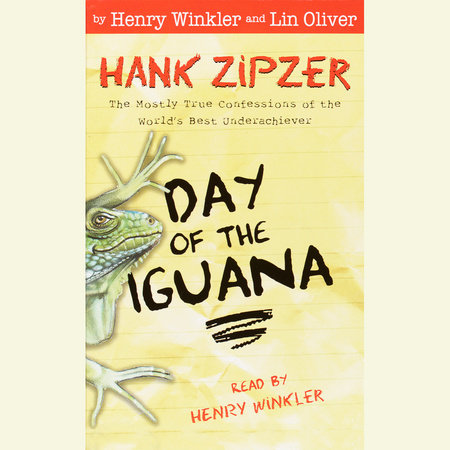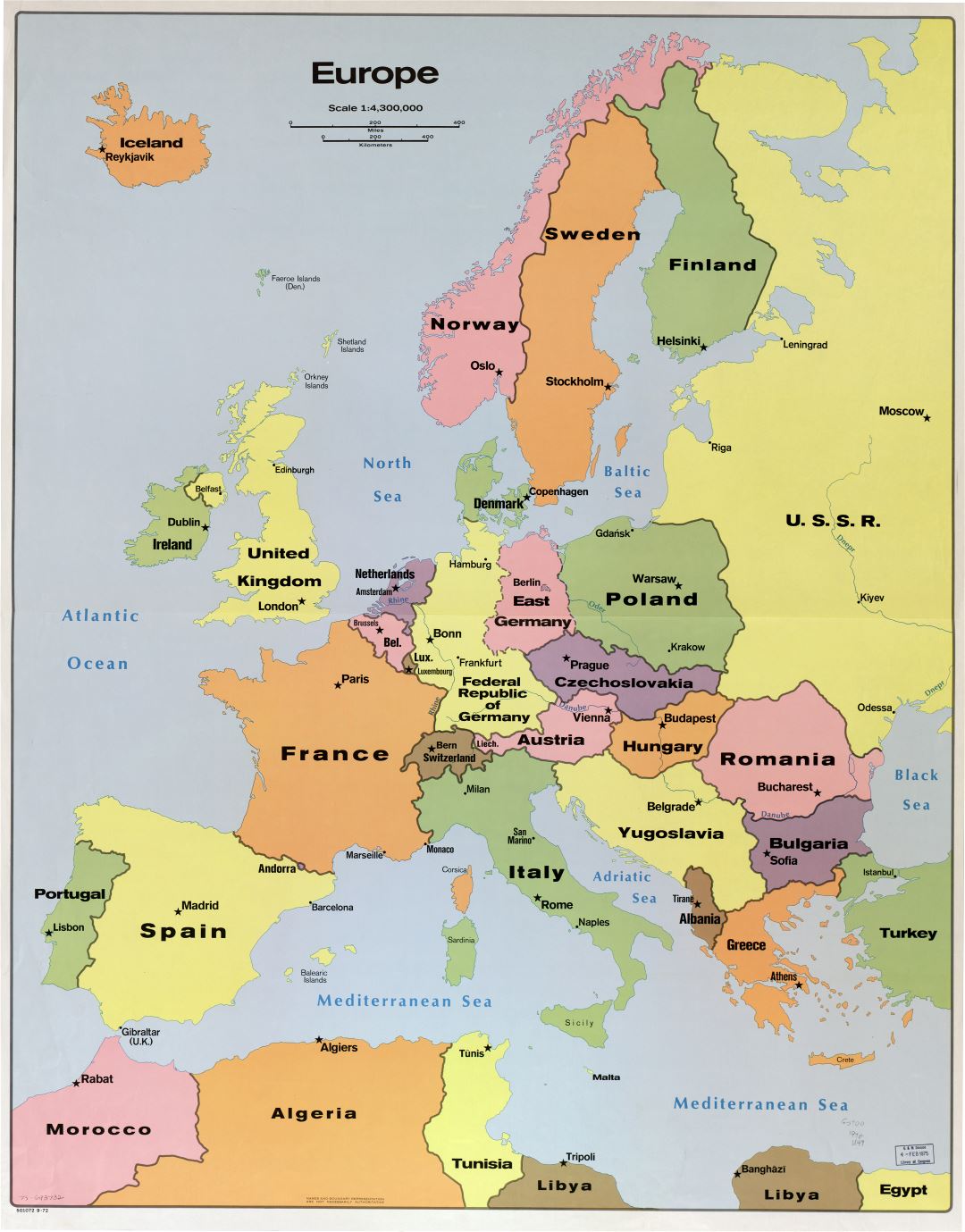Describe scylla and charybdis
Describe Scylla And Charybdis. The huge mouth that could swallow all of them in an instant was the aspect the frightened the men even more. Scylla and Charybdis were monsters from Greek mythology thought to inhabit the Straits of Messina the narrow sea between Sicily and the Italian mainland. Charybdis was portrayed as a whirlpool that took water down the depths three times a day and brought it back up the same number of times. Who escapes scylla and charybdis.
 Scylla And Charybdis Description Tales Legacy Britannica From britannica.com
Scylla And Charybdis Description Tales Legacy Britannica From britannica.com
The huge mouth that could swallow all of them in an instant was the aspect the frightened the men even more. This strait was navigated by the Argo Odysseus and Aeneas and the dangers there faced were overcome. Scylla and Charybdis are two famous monsters from Greek mythology who worked in tandem on the opposite sides of a narrow strait of water. Go through a passage called the Moving Rocks or the Rovers where only one ship has ever passed through safely because Hera Zeuss wife willed it. Each head was supported by a long thin neck and in each mouth there were three rows of razor sharp teeth hungry for flesh. Charybdis is the sportswoman she wields physical power she is cold and calculating and she can cause a lot of damage.
The rock opposite of Charybdis proposed no danger but Odysseus had been warned by Circe about Scylla the monster who lived in a cave in the rock.
Scylla has a multitude of dog headed snake limbs in place of her legs. Charybdis is the sportswoman she wields physical power she is cold and calculating and she can cause a lot of damage. Sea monster that sits under the water and sucks it in 3 times a day then spews it out no survival rate. Start studying The Sirens. Who distracts odysseus from his troubles after scylla and charybdis. Scylla and Charybdis were both extremely powerful parts of the sea.
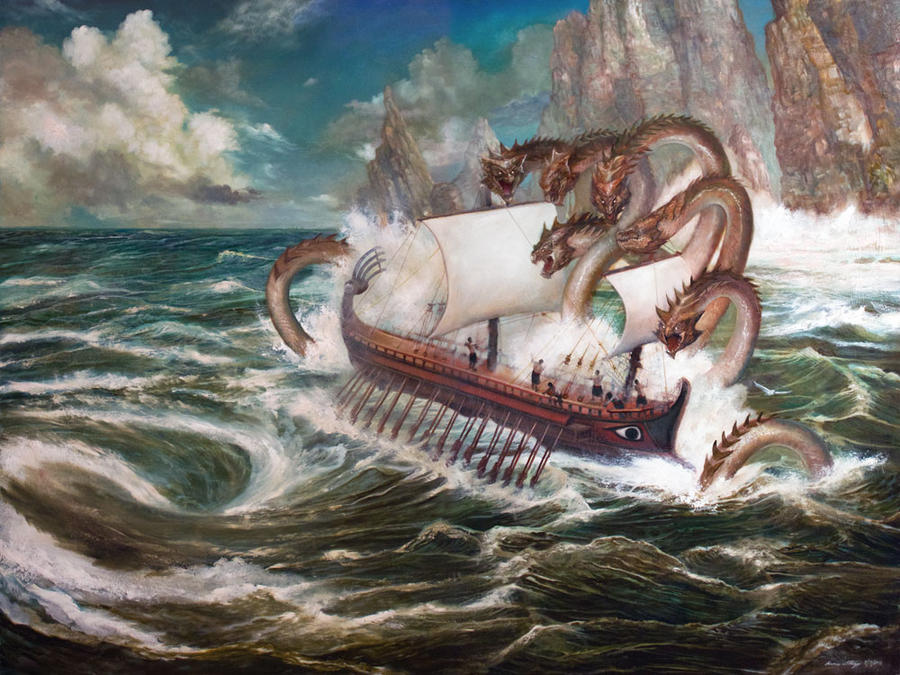 Source: gcoe-dresden.de
Source: gcoe-dresden.de
Charybdis was portrayed as a whirlpool that took water down the depths three times a day and brought it back up the same number of times. Describe the problems that telemachus experiences in ithica. A monstrous sea goddess who haunted the rocks of certain narrow strait opposite the whirlpool Charybdis How did Homer describe Scylla. Scylla and Charybdis are two famous monsters from Greek mythology who worked in tandem on the opposite sides of a narrow strait of water. Odysseus dilemma is how to navigate through.
 Source: medium.com
Source: medium.com
A creature with 12 dangling feet 6 long necks and grisly heads lined with a triple row of sharp teeth. Scylla has a multitude of dog headed snake limbs in place of her legs. Scylla had a shrill yip like that of a dogs and six grisly heads. Who escapes scylla and charybdis. Describe Scylla and Charybdis.
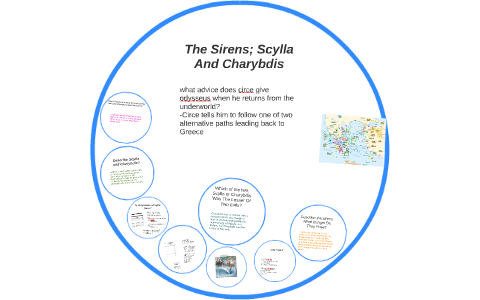 Source: prezi.com
Source: prezi.com
Scylla and Charybdis were both extremely powerful parts of the sea. A monstrous sea goddess who haunted the rocks of certain narrow strait opposite the whirlpool Charybdis How did Homer describe Scylla. The rock opposite of Charybdis proposed no danger but Odysseus had been warned by Circe about Scylla the monster who lived in a cave in the rock. Scylla and Charybdis - a Rock and a Hard Place. They were later localized in the Strait of Messina.
 Source: interestingliterature.com
Source: interestingliterature.com
The rock opposite of Charybdis proposed no danger but Odysseus had been warned by Circe about Scylla the monster who lived in a cave in the rock. Summary The phrase between Scylla and Charybdis derives from two dangerous entities found in the Mediterranean sea which Homer tells us about in his Odyssey. Charybdis is the sportswoman she wields physical power she is cold and calculating and she can cause a lot of damage. The huge mouth that could swallow all of them in an instant was the aspect the frightened the men even more. In Homer s Odyssey Scylla is a six-headed man-eating monster positioned across a narrow strait from an enormous ship-swallowing whirlpool Charybdis.
 Source: britannica.com
Source: britannica.com
Charybdis has a single large-mouthed monster in place of her left arm hidden underneath a royal cloak. Charybdis was portrayed as a whirlpool that took water down the depths three times a day and brought it back up the same number of times. Scylla and Charybdis are two famous monsters from Greek mythology who worked in tandem on the opposite sides of a narrow strait of water. How does the poets language convey the fearfulness lines 172-187. Scylla had a shrill yip like that of a dogs and six grisly heads.
 Source: youtube.com
Source: youtube.com
A creature with 12 dangling feet 6 long necks and grisly heads lined with a triple row of sharp teeth. Myth of Scylla and Charybdis. The huge mouth that could swallow all of them in an instant was the aspect the frightened the men even more. Odysseus dilemma is how to navigate through. Sea monster that sits under the water and sucks it in 3 times a day then spews it out no survival rate.
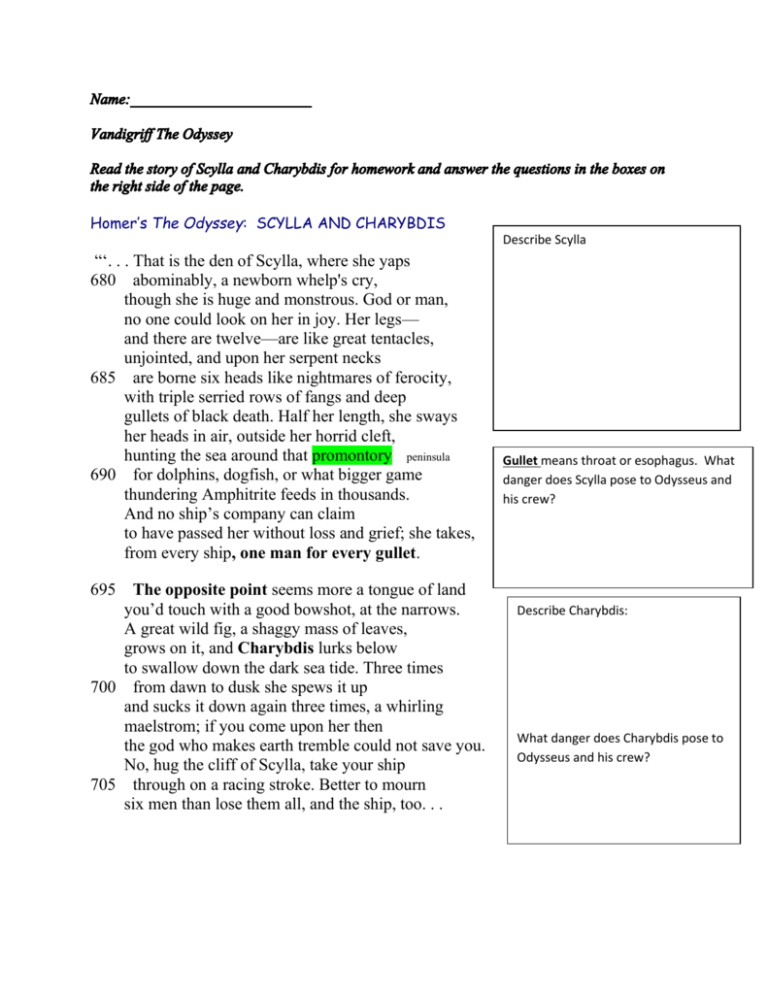 Source: studylib.net
Source: studylib.net
This strait was navigated by the Argo Odysseus and Aeneas and the dangers there faced were overcome. Scylla and Charybdis in Greek mythology two immortal and irresistible monsters who beset the narrow waters traversed by the hero Odysseus in his wanderings described in Homer s Odyssey Book XII. Myth of Scylla and Charybdis. Scylla has a multitude of dog headed snake limbs in place of her legs. Charybdis was portrayed as a whirlpool that took water down the depths three times a day and brought it back up the same number of times.
 Source: thewordexplorer.blog
Source: thewordexplorer.blog
This strait was navigated by the Argo Odysseus and Aeneas and the dangers there faced were overcome. Scylla and Charybdis were monsters from Greek mythology thought to inhabit the Straits of Messina the narrow sea between Sicily and the Italian mainland. A creature with 12 dangling feet 6 long necks and grisly heads lined with a triple row of sharp teeth. Myth of Scylla and Charybdis. Scylla was the six headed monster who took a man for each of her headsv Charybdis was the whirlpool right nextto Scyllas cave.
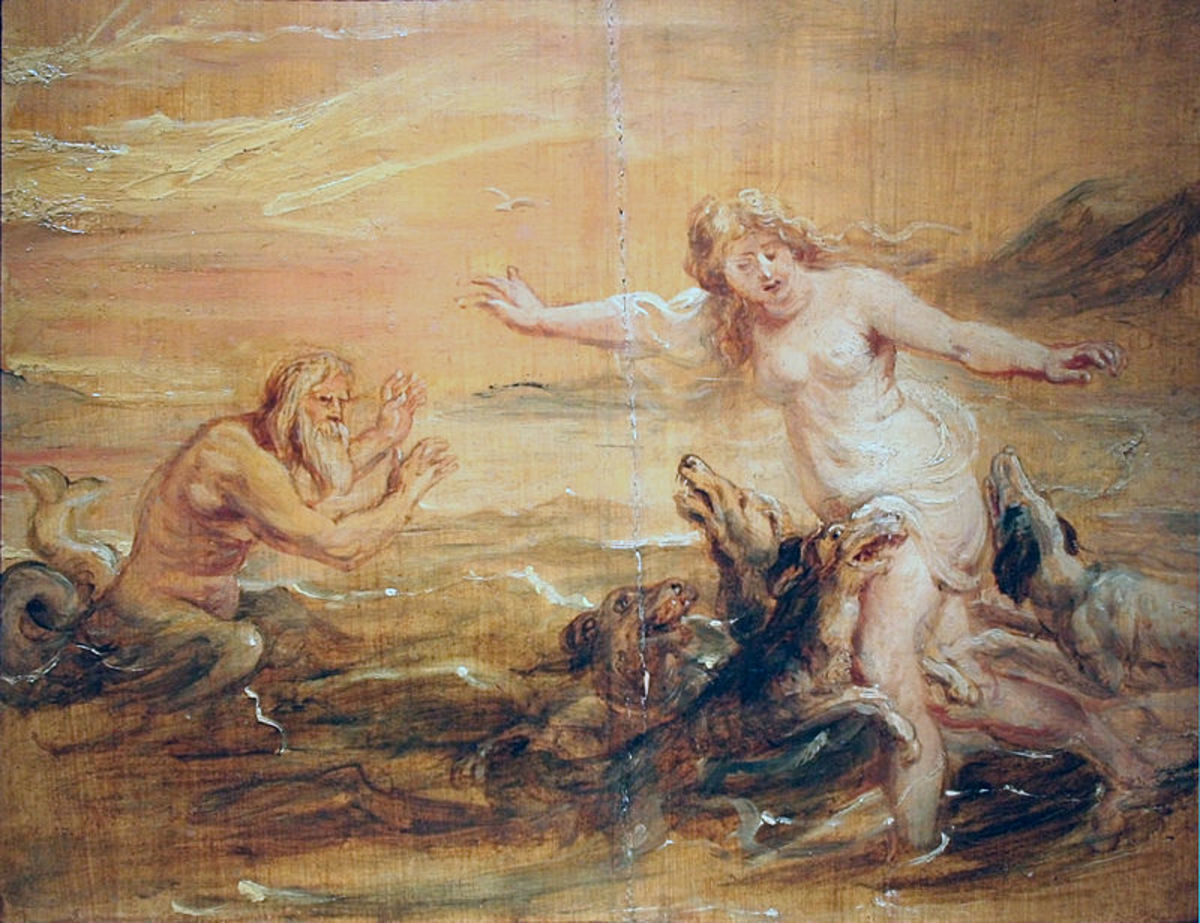 Source: owlcation.com
Source: owlcation.com
Odysseus dilemma is how to navigate through. Go through a passage called the Moving Rocks or the Rovers where only one ship has ever passed through safely because Hera Zeuss wife willed it. They were later localized in the Strait of Messina. Scylla and Charybdis in Greek mythology two immortal and irresistible monsters who beset the narrow waters traversed by the hero Odysseus in his wanderings described in Homer s Odyssey Book XII. Scylla has a multitude of dog headed snake limbs in place of her legs.
 Source: owlcation.com
Source: owlcation.com
Summary In this chapter Ulysses and his crew had to sail down the straight of Charybdis daughter of Poseidon who is now a monster that drinks the sea and spits it out to form deadly whirlpools and Scylla who is a monster spider that eats humans. Scylla and Charybdis in Greek mythology two immortal and irresistible monsters who beset the narrow waters traversed by the hero Odysseus in his wanderings described in Homer s Odyssey Book XII. Which aspect of Charybdis frightens the men more. Scylla and Charybdis were monsters from Greek mythology thought to inhabit the Straits of Messina the narrow sea between Sicily and the Italian mainland. Summary The phrase between Scylla and Charybdis derives from two dangerous entities found in the Mediterranean sea which Homer tells us about in his Odyssey.
 Source: en.wikipedia.org
Source: en.wikipedia.org
Sea monster that sits under the water and sucks it in 3 times a day then spews it out no survival rate. Go through a passage called the Moving Rocks or the Rovers where only one ship has ever passed through safely because Hera Zeuss wife willed it. Scylla had a shrill yip like that of a dogs and six grisly heads. They were later localized in the Strait of Messina. Sea monster that sits under the water and sucks it in 3 times a day then spews it out no survival rate.

Learn vocabulary terms and more with flashcards games and other study tools. Myth of Scylla and Charybdis. Which aspect of Charybdis frightens the men more. Who distracts odysseus from his troubles after scylla and charybdis. Scylla was the six headed monster who took a man for each of her headsv Charybdis was the whirlpool right nextto Scyllas cave.
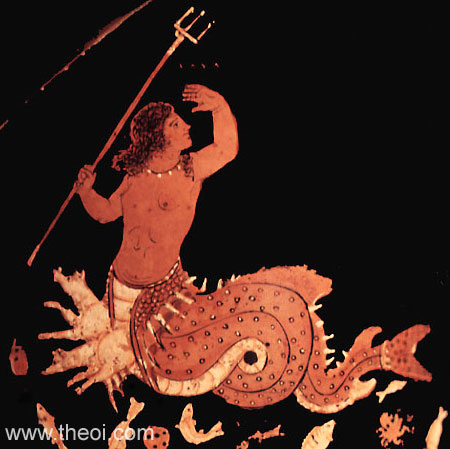 Source: theoi.com
Source: theoi.com
Scylla has a multitude of dog headed snake limbs in place of her legs. Scylla has a multitude of dog headed snake limbs in place of her legs. How does the poets language convey the fearfulness lines 172-187. They were supposedly found on opposite sides. The rock opposite of Charybdis proposed no danger but Odysseus had been warned by Circe about Scylla the monster who lived in a cave in the rock.
 Source: en.wikipedia.org
Source: en.wikipedia.org
Summary The phrase between Scylla and Charybdis derives from two dangerous entities found in the Mediterranean sea which Homer tells us about in his Odyssey. Scylla and Charybdis are two famous monsters from Greek mythology who worked in tandem on the opposite sides of a narrow strait of water. This strait was navigated by the Argo Odysseus and Aeneas and the dangers there faced were overcome. A monstrous sea goddess who haunted the rocks of certain narrow strait opposite the whirlpool Charybdis How did Homer describe Scylla. Learn vocabulary terms and more with flashcards games and other study tools.
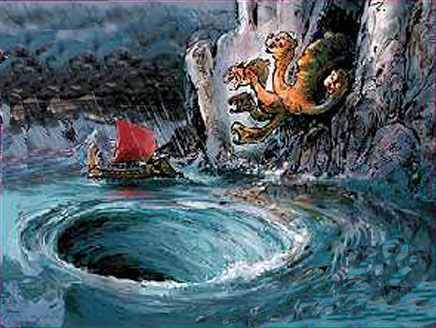 Source: turtledove.fandom.com
Source: turtledove.fandom.com
How does the poets language convey the fearfulness lines 172-187. Each head was supported by a long thin neck and in each mouth there were three rows of razor sharp teeth hungry for flesh. Scylla and Charybdis were both extremely powerful parts of the sea. They were later localized in the Strait of Messina. Scylla had a shrill yip like that of a dogs and six grisly heads.
If you find this site beneficial, please support us by sharing this posts to your preference social media accounts like Facebook, Instagram and so on or you can also bookmark this blog page with the title describe scylla and charybdis by using Ctrl + D for devices a laptop with a Windows operating system or Command + D for laptops with an Apple operating system. If you use a smartphone, you can also use the drawer menu of the browser you are using. Whether it’s a Windows, Mac, iOS or Android operating system, you will still be able to bookmark this website.


